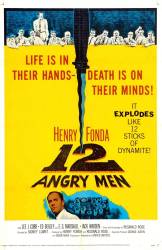Continuity mistake: Early in the film, Henry Fonda and another juror are in the men's room. When the other juror exits, the door is a swinging door. From the jury room the door is a regular door with a door knob. You can hear the door close when Henry Fonda exits and closes the door.

12 Angry Men (1957)
1 continuity mistake - chronological order
Directed by: Sidney Lumet
Starring: Henry Fonda, Martin Balsam, Lee J. Cobb, John Fiedler, Jack Klugman, E.G. Marshall
Deliberate mistake: When Henry Fonda decides to recreate the old witness' ability to get to the door in 15 seconds, he asks another juror to time his walk. The scene never cuts away, but the juror who times it says it took 41 seconds when in reality it takes exactly 31 seconds, you can time it.
Juror #6: You think he's not guilty, huh?
Juror #8: I don't know. It's possible.
More trivia for 12 Angry MenMore questions & answers from 12 Angry Men
Join the mailing list
Separate from membership, this is to get updates about mistakes in recent releases. Addresses are not passed on to any third party, and are used solely for direct communication from this site. You can unsubscribe at any time.
Check out the mistake & trivia books, on Kindle and in paperback.




Answer: Depends where, and the type of case. At the time the film was made, women were still barred from juries in three states (South Carolina, Mississippi, and Alabama); it wasn't until 1994 that the Supreme Court ruled that lawyers could not strike women from juries solely on the basis of gender. SCOTUS had ruled in 1942 that all-male juries were constitutionally acceptable. New York State (where the story is set) had granted women the right to serve on juries in 1927, so an all-male jury may not have been the norm across the board, but the nature of the crime (murder) would have, at the time, allowed lawyers to exclude women at the jury selection stage by citing the unsavoury aspects of the crime and arguing that the details of the case were not "suitable" for women to hear (being such delicate creatures, you understand /s).